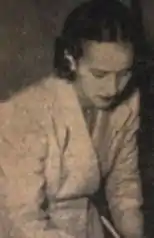Rosa Rojas Castro
Rosa Rojas Castro (29 June 1919 – 22 October 1959) was the first Colombian woman to obtain a doctorate and first woman lawyer in the country. She is remembered as a pioneer who opened higher education and professional careers to women.
Rosa Rojas Castro | |
|---|---|
 | |
| Born | 29 June 1919 Tocaima, Colombia |
| Died | 22 October 1959 (aged 40) Bogotá, Colombia |
| Nationality | Colombian |
| Other names | Rosita Rojas Castro |
| Occupation | attorney |
| Years active | 1943–1959 |
Biography
Rosa Rojas Castro was born on 29 June 1919[1] in Tocaima, in the Cundinamarca Department, located in central Colombia. After earning a bachelor's degree in literature at the Alice Block Institute in Bogotá in 1937, she enrolled in legal courses at the Universidad Externado de Colombia. When she completed her doctorate in law and political science on 14 June 1942, she became the first woman in the country to earn a university degree.[1][2] Though she completed the requirements to become a lawyer, a lawsuit was filed challenging her right to practice law, using the argument that if women had no political identity, they could not act on behalf of the public. Her professors served as her legal team and successfully argued that women could hold public office, confirming that she was the first woman lawyer in the country. On 1 July 1943, she was appointed to serve as the Third Judge of the Bogotá Circuit of the Superior Court.[2][3]
The controversy over Rojas' appointment was carried in local newspapers and on the radio, galvanizing professional women to form the Unión Femenina de Colombia (UFC) (Women's Union of Colombia) in 1944 to fight for equal rights and opportunity for women.[4] She worked in the Penal Courts from 1943 to 1947 and simultaneously taught at the Universidad Javeriana until 1945. Then in 1947, she was appointed as the Judge of First Instance for the Criminal Court of Facatativá,[1] where she served until her death on 22 October 1959 from encephalitis.[3][5] She is remembered as one of the pioneering women who opened higher education and professional careers to women in Colombia.[1]
References
Citations
- Perry 1952, p. 959.
- Bank of the Republic 2017.
- Vallejo 2005.
- Luna & Villarreal 1994, p. 100.
- Melo Lancheros 1966, p. 957.
Bibliography
- Luna, Lola G.; Villarreal, Norma (1994). Historia, género y política: movimientos de mujeres y participación política en Colombia 1930–1991 [History, gender and politics: women's movements and political participation in Colombia 1930–1991] (in Spanish) (1st ed.). Barcelona, Spain: Edición del Seminario Interdisciplinar Mujeres y Sociedad. ISBN 84-477-0320-7. Archived from the original on 5 September 2018.CS1 maint: ref=harv (link)
- Melo Lancheros, Livia Stella (1966). Valores femeninos de Columbia (in Spanish). Bogotá, Colombia: Editorial y Papelería Carvajal. OCLC 2186654.CS1 maint: ref=harv (link)
- Perry, Oliverio, ed. (1952). "Rojas Castro Rosa". Quien es quien en Venezuela, Panama, Ecuador, Columbia (in Spanish). Bogotá, Colombia: Cía Editores: 959. ISSN 0481-4096. Retrieved 5 September 2018.CS1 maint: ref=harv (link)
- Vallejo, Carlos (12 March 2005). "Las primeras..." [The firsts...]. Semana (in Spanish). Bogotá, Colombia. Archived from the original on 13 February 2018. Retrieved 5 September 2018.CS1 maint: ref=harv (link)
- "Personajes del año (1942 a 1944)" [Person of the year (1942 to 1944)]. Banco de la República (in Spanish). Bogotá, Colombia: Red Cultural de Banco de la República en Colombia. 2017. Retrieved 5 September 2018.
Further reading
- "Alegato". Revista de la Academia Colombiana de Jurisprudencia (in Spanish). Bogotá, Colombia: Aguila Negra for Academia Colombiana de Jurisprudencia. 147: 687–710. 1944. ISSN 0123-3017.
- "International Association Meets". Women Lawyers Journal. New York City, New York: National Association of Women Lawyers. 34 (1): 21–22. 1948. ISSN 0043-7468.